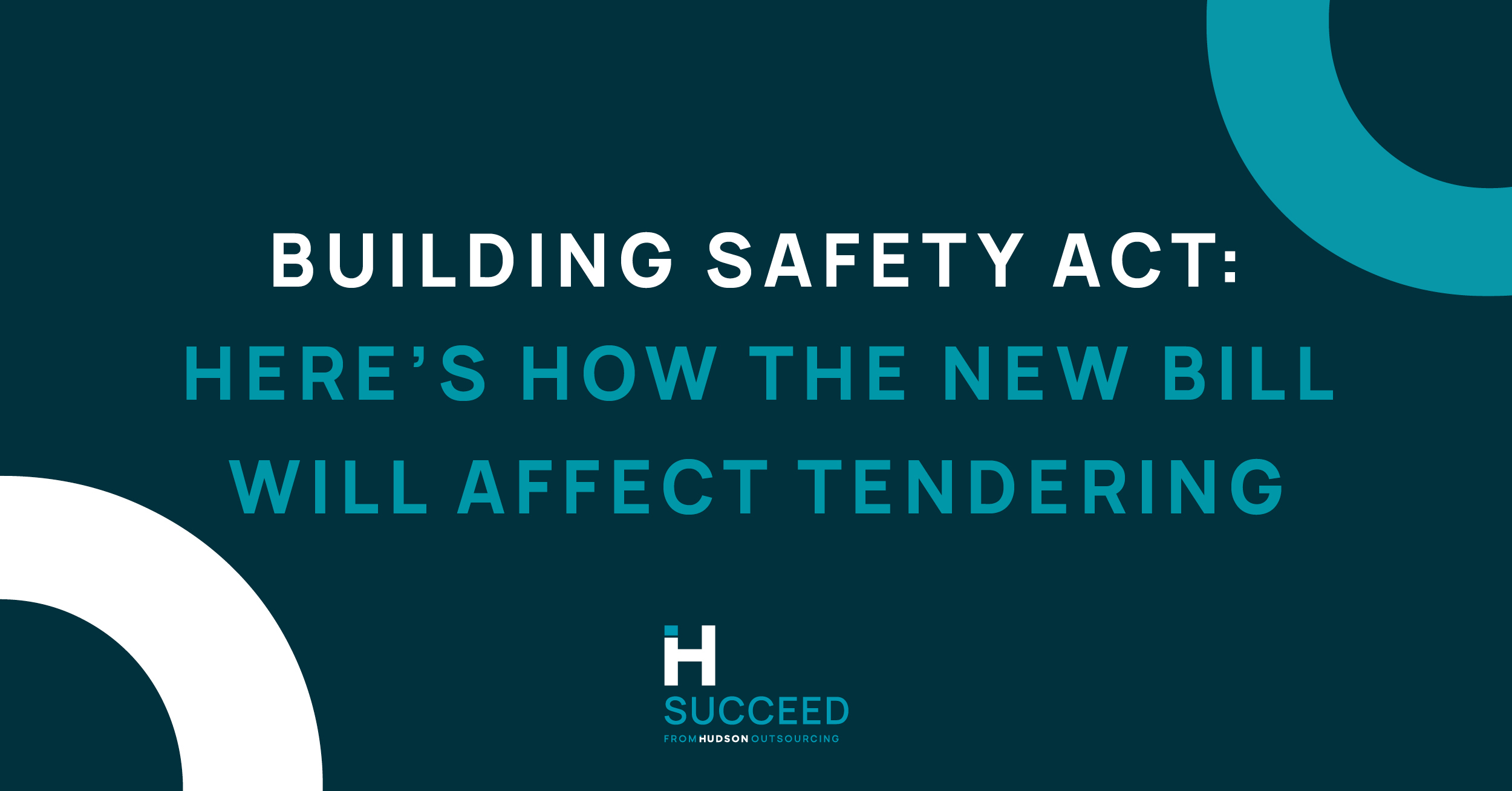Here’s what you should know about the Building Safety Act and its effect on tendering
Following the Grenfell Tower fire in June 2017, the Building Safety Act was introduced by parliament. The aim of this Bill is to improve the safety of buildings. It also has a particular emphasis on ‘higher risk buildings’, which are over a specified height.
The Building Safety Act was put in place to give residents more power to hold builders and developers accountable. It will also mean tougher sanctions against those that are jeopardising the safety of residents. The Bill passed Royal Assent on 28 April 2022 and will apply to both current and future ‘high-risk’ buildings.
Those working in construction and procurement may wonder how the Building Safety Act will impact the industry. Keep reading to learn the answers!
What are the key changes to the Building Safety Act?
Here are some of the main points of change within the Building Safety Act:
1. The creation of the role of a Building Safety Regulator
A Building Safety Regulator will be responsible for overseeing the new regime. Initially, however, the Health and Safety Executive will assume this role. They will have to ensure that they manage any building safety risks.
2. An overhaul of parts of the Building Act 1984
Many of the Building Safety Act’s elements from 1984 will be revised to be more up to date.
3. The creation of specific provisions in relation to ‘higher-risk buildings’
This will be for new and existing high-rise residential buildings of 18m and above (seven storeys or more).
4. The introduction of a New Home Ombudsman
The New Home Ombudsman scheme aims to provide methods of resolutions for complaints and disputes. These disputes are those issued by buyers of new build homes against the developers.
5. Reform of the regulation of architects, construction products and the Regulatory Reform (Fire Safety) Order 2005
Given the fire damage at Grenfell, the materials used in construction will now be under heavy scrutiny. It is vital that materials and products are considered for all possible incidents.
6. Extending limitation periods relating to the Defective Premises Act 1972 and The Building Act 1984
Due to the outdated Bill, the government is extending time periods in which landlords and developers can be held accountable. This offers residents more of an opportunity to hold them accountable for issues from before the Building Safety Act’s revision.
7. The introduction of new gateways during the planning and construction process
The introduction of further key decision points (gateways) will enhance development management.
What impact will the Building Safety Act changes have on tendering in the construction industry?
As the Building Safety Act comes into force, there will be a range of changes within the construction industry. These changes will also affect the way tendering is conducted. Some of the impacts we expect are as follows…
Due to the changes within the Building Safety Act, we suspect that quality questions will become the focus. There will likely be a far greater emphasis on the health and safety aspects of tenders.
Suppliers will be expected to give evidence to support their claims. Plus, they’ll need to show how these are carried out and put in place for years to come. The longevity of safety is a key part of the Building Safety Act. Buyers will want to know that suitable building materials will be used. As well as the methods and the various precautions in place to safeguard residents.
Summary
Here’s a summary of what we covered:
What are the key changes to the Building Safety Act?
- The creation of the role of a Building Safety Regulator
- An overhaul of parts of the Building Act 1984
- The creation of specific provisions in relation to ‘higher-risk buildings’
- The introduction of a New Home Ombudsman
- Reform of the regulation of architects, construction products and the Regulatory Reform (Fire Safety) Order 2005
- Extending limitation periods relating to the Defective Premises Act 1972 and The Building Act 1984
- The introduction of new gateways during the planning and construction process.
What impact will the Building Safety Act changes have on tendering in the construction industry?
There will likely be more emphasis on quality questions in tenders and bid proposals. Health and safety will be the primary focus.
Need help searching for tenders?
You may be wondering where you can find a tender for your business. There’s no shortage of websites offering multi-sector tendering opportunities and leads. Ideally, you should be searching for a sector-specific site that posts all unique, public and private sector opportunities.
Our sister company, Hudson Discover, has 11 sector-specific tendering portals. One centralised and easy-to-navigate portal can help you save time, streamlining the process.
Once signed up, you’ll have access to your own dedicated Account Manager. They’ll be able to answer any questions you may have about public sector contracts. You’ll also get an email alert when we upload new and relevant tenders to your sector.
Discover Elite
If you want to streamline the process even further, you can sign up to Discover Elite via your chosen portal. With this service, a dedicated Account Manager will find live bids on your behalf. They’ll speak with you weekly to discuss opportunities that may interest you. This is especially helpful for those with little time to spare due to busy schedules.
A subscription to one of our industry-specific portals will include:
- Unlimited portal access. You can browse your industry’s portal to your heart’s content. See the hundreds of opportunities that are available, intuitively categorised and easily accessible.
- A daily email bulletin. We will send you an email alert when we upload new tenders.
- A dedicated Account Manager. They’ll handle any questions or queries you may have about the portal.
- A free 20-minute phone consultation with a Bid Writer. Our expert Bid Consultants will chat with you about anything tender related.
What opportunities can I expect from a tender search on a Hudson Discover portal?
We host all kinds of tenders in both the public and private sectors. These are inclusive of, but aren’t limited to:
Now you know how to accurately perform a tender search, you may be wondering how to write a bid. Well, luckily for you, Hudson Succeed, are experts in bid writing.
We have over 60 years of bid writing experience and an 87% success rate. Whether you’re completely new to tendering or aren’t seeing results – they can help. There are four bid writing packages available:
Once you’ve found a tender you’d like to go for, send it over to us. One of our Bid Writers will write the tender response for you. They’ll provide a full Tender Writing breakdown and even submit it on your behalf.
Tender Mentor can give your tender response a once-over before you submit it. The Bid Writing Team will analyse your response, notifying you of any errors and opportunities for improvements prior to submission.
During the Tender Ready service, our team will create professional policies, procedures, and case studies in your company branding. If you already have this content, we will review everything carefully to ensure that nothing is missed. This service also helps businesses that are new to tendering with terminology and industry knowledge.
The Tender Improvement package can help those who have tendered before but aren’t seeing results. Our Bid Writers will assess your previous responses and work with you to develop improved content.
Get in touch to find out how we can help your business grow.
Vocal
Our support doesn’t end there! Our creative content agency, Vocal, are on hand to help.
At Vocal, our team are never afraid to be heard. And we make sure our clients aren’t either! From small, micro businesses to large organisations, we are vocal about the things that make your business unique.
Our creative service is dedicated to growing your business through striking and thought-provoking content. Our team specialise in six areas, including:
If you’d like to know more about what we can do for your business, introduce yourself to the team!
Contact us today to find out more.
Find more helpful tips and advice in our blogs. We cover topics including:





